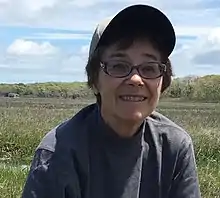Judith Weis
Judith Shulman Weis (born May 29, 1941)[1] is an American marine biologist. Her research and writing focuses on estuarine ecology and ecotoxicology, including the responses of salt marsh organisms, populations and communities to stresses, particularly heavy metal contaminants, invasive species and parasites. She is also working to reduce the spread of microplastics in the environment.

Weis is professor emerita of marine biology at Rutgers University, where she taught for five decades. She is a Fellow of the American Association for the Advancement of Science and chairs the Science Advisory Board of the NJ DEP, among other bodies.
Early life and education
Weis was born and raised in New York City in a secular Jewish family.[1] She graduated Bronx High School of Science in 1958 and earned her B.A. in 1962 from Cornell University, majoring in zoology. She received her M.S. in 1964 and Ph.D. in biology in 1967, both from New York University.[2]
Career
Weis had a summer internship in 1960, while in Cornell, at the Marine Biological Laboratory in Woods Hole, Massachusetts. Immediately after receiving her Ph.D., Weis joined the faculty of Rutgers University in Newark, New Jersey, in 1967, where she was promoted to Professor in 1976.[3] In addition to teaching, she has conducted research on the threats faced by organisms in shallow coastal estuary environments, such as contamination from pollution, especially heavy metals, and invasive species.[2] Much of her research has been with marine life in the New York–New Jersey Harbor area, but she has also done research in Indonesia and Madagascar.[3] In the 1970s, Weis and her children starred in a Tang orange drink commercial because General Foods was promoting the product with ads featuring scientists with cute kids.[4] During a sabbatical in 1983–1984, she received a Congressional Science Fellowship from the American Association for the Advancement of Science (AAAS) where she worked for the Environment and Public Works Committee of the US Senate.[4] By publishing studies about how products such as pressure-treated wood used in bulkheads and pilings leach toxic metals into waterways, Weis has been able to influence laws and regulations that have led to manufacturers removing toxic metals from the products. Among the legislation that she has worked on were amendments to the Safe Drinking Water Act and Resource Conservation and Recovery Act.[4]
Weis later served on advisory committees for the US EPA, National Sea Grant College Program of NOAA, and the New Jersey Department of Environmental Protection, where she chairs the scientific advisory board.[4] She co-chairs the Science and Technical Advisory Committee for the NY/NJ Harbor Estuary.[3] She also serves on the Waterfront Management Advisory Board of New York City and the National Marine Team of the Sierra Club and Plastic Free Waters Partnership.[2][4] Weis has served as president of the American Institute of Biological Sciences and volunteered with the Ecological Society of America, among other scientific bodies, and worked on the Intergovernmental Panel on Biodiversity and Ecosystem Services and other United Nations (UN) reports. As of 2020, she is again coordinating the salt marsh chapter for the next iteration of the World Ocean Assessment for the UN.[4] Earlier in her career, she became interested in the women's movement after an argument with a sexist colleague at Rutgers[4] and soon became active with the National Organization for Women and has served on the board of the Association for Women in Science, among other activist organizations.[1]
As of 2020, Weiss is Professor Emerita of Biological Sciences at Rutgers[5][6] where she taught for over five decades.[7] She has published over 200 refereed scientific papers and written several books about marine biology. She has been married to Peddrick "Pete" Weis since 1962. He is also an academic, and the couple have two children, Jennifer and Eric, and three grandchildren.[2] Weis enjoys choral singing and performing in musical theatre and comic opera, including at the International Gilbert and Sullivan Festival.[3]
Bibliography
- Salt Marshes: A Natural and Unnatural History (2009; with Carol A. Butler)
- Do Fish Sleep? (2011)
- Walking Sideways: The Remarkable World of Crabs (2012)
- Physiological, Developmental, and Behavioral Effects of Marine Pollution (2013)
- Marine Pollution: What Everyone Needs to Know (2014)
- Biological Invasions and Animal Behaviour (2016; co-edited with Daniel Sol)
Awards
- Fellow of AAAS (elected 1985)
- Governor's Science Advisory Committee, NJ
- Marine Board of the National Research Council, 1991
- Environmental Award from Accabonac Protection Committee, 1996
- Rutgers Class of 1962 Presidential Public Service Award, 2003–2004
- Fulbright Senior Specialist – Indonesia (Hasanuddin University, Makassar, South Sulawesi), May 2006
- Merit Award from the Society of Wetland Scientists, 2016
References
- Dr. Judith S. Weis, Interview by Veteran Feminists of America, July 2018
- Swiatkowski, Paula. "Working for a Sea Change", Sierra Club, May 6, 2019
- "Judith S. Weis", Rutgers University, accessed October 11, 2020
- Verdier, James. "In Their Own Words: Judith Weis", BioScience, Vol. 70, Issue 6, June 2020, pp. 461–467, Oxford University Press (subscription required)
- "Judith Weis", The Conversation, Retrieved July 6, 2020
- "Judith S. Weis", Rutgers University. Retrieved July 6, 2020
- "Women of Science", Rutgers University, accessed May 19, 2019